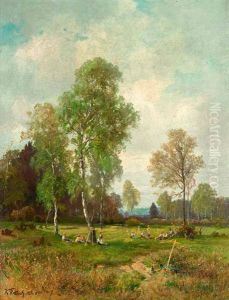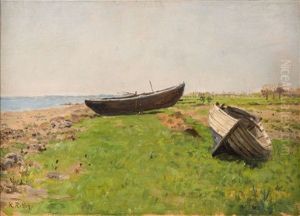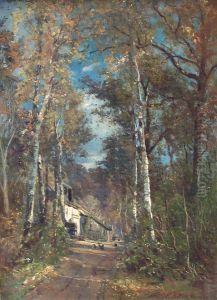Karl Lorenz Rettich Paintings
Karl Lorenz Rettich was a notable figure in the 19th-century German music scene, primarily recognized for his contributions as a composer, conductor, and organist. Born in 1811, Rettich embarked on his musical journey at a young age, showing a profound interest and innate talent in music. His early life was marked by rigorous study and dedication to mastering his craft, which laid the foundation for his future accomplishments in the music world.
Throughout his career, Rettich was deeply involved in the musical life of Germany, contributing significantly to the development of choral and organ music during his time. He held various influential positions, including that of an organist at prominent churches, where his performances and compositions left a lasting impact on the congregation and the broader music community. As a conductor, Rettich was known for his ability to inspire and lead ensembles to achieve remarkable musical expressions, bringing out the best in the choirs and orchestras under his direction.
Rettich's compositions, although not as widely known today as those of some of his contemporaries, were highly regarded by his peers and the audiences of his time. His works, which include a variety of choral pieces, organ compositions, and orchestral works, are characterized by their melodic beauty, harmonic richness, and depth of emotional expression. Through his compositions, Rettich sought to explore and express the spiritual and aesthetic dimensions of music, drawing upon the rich traditions of German music while also incorporating his own unique voice and perspective.
Despite facing challenges and obstacles throughout his career, including the shifting musical tastes and trends of the 19th century, Rettich remained dedicated to his art, continuously striving to innovate and elevate the music he created and performed. His contributions to the music world were not only limited to his compositions and performances but also included his efforts as an educator and mentor to younger musicians, passing on his knowledge and passion for music to the next generation.
Karl Lorenz Rettich passed away in 1879, leaving behind a legacy that, though perhaps not as widely recognized as that of some of his contemporaries, was nevertheless significant for its contribution to the development of 19th-century German music. His work continues to be appreciated by those who explore the rich tapestry of music history, serving as a testament to the enduring power and beauty of musical expression.

























